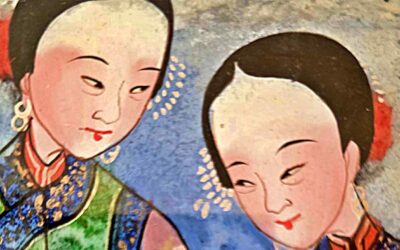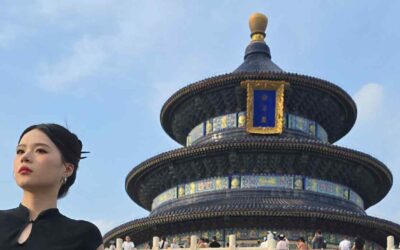12 Chinese idioms related to the tiger
With the arrival of the Year of the Tiger 2022, here are 12 set phrases (chengyu) related to the tiger, so that those who are getting familiar with the Chinese language can practice one each month.
- As a wolf, as a tiger 如狼似虎 rúlángsìhǔ
It points to someone as fierce as wolves and tigers. The metaphor is that the person is fierce and cruel.
- The fox borrows the strength of the tiger 狐假虎威 hújiǎhǔwēi.
It is used as a metaphor for the person who relies on fear of others to show herself as powerful.
There is a beautiful tale that narrates its origin:
Once upon a time there was a tiger ready to eat the hundred kinds of animals that populate the forest. He had already eaten ninety-nine when he captured a fox that must have been number one hundred. The latter, seeing himself lost, thought of a way to escape his fate, so showing great displeasure he said: «Hey, tiger, how dare you touch me, don’t you know that I have been appointed by the gods to be the king of the jungle? And you grabbing me like this.»
Seeing that the tiger looked at him quizzically he continued his charade. «When the gods find out they will surely punish you.» And seeing a hint of doubt in the tiger’s gaze, he added: «If you don’t believe me let’s go for a walk in the forest and you’ll see the respect with which all the animals treat me. You go ahead and I will follow you.»
The tiger was not entirely convinced of the fox’s words, but since it would cost him nothing to be sure either, he agreed to take a walk with the fox. So they went into the forest, and naturally all the animals, on seeing the tiger, fled in terror. The tiger, convinced that they did so because of the fox’s importance, ran away fearful that he had offended the gods, while the fox writhed with laughter, satisfied with his cunning.
- Painting a tiger does not work 画虎不成 huàhǔbùchéng.
It is a metaphor used to describe an overly ambitious person who ends up achieving nothing in the end, who is a laughingstock.
- Move the tiger off the mountain 调虎离山 diàohǔlíshān.
It means trying to get the tiger to leave its original hillock. It is to get an opponent to leave his original place, where he is more powerful and knows the terrain better, and thus have a chance to be able to defeat him.
- Dragon Pond and Tiger Cave 龙潭虎穴 lóngtánhǔxué
Traditionally in China, dragons are thought to dwell in wells and ponds and tigers in mountain caves. In this idiom, by referring to the places these two powerful animals inhabit, a metaphor is constructed to refer to an extremely dangerous place.
- The back of the tiger and the waist of the bear 虎背熊腰 hǔbèixióngyāo.
Since in popular appreciation the tiger’s back, which it bends to jump is its most powerful part, as is the waist in the bear, by using these two parts of these two powerful animals one can depict a physically robust and strong person.
- Live dragon and tiger 生龙活虎 shēnglónghuóhǔ.
It actually repeats the concept that both the dragon and the tiger are alive, and thus refers to a lively and vigorous person, rich in vitality.
- Swallow the wolf and swallow the tiger 狼吞虎咽 lángtūnhǔyàn.
Another redundancy in which the concept is repeated. Both the wolf and the tiger devour, thereby describing the situation of «eating like a wolf.»
- To look with the eye of the tiger 虎视眈眈 hǔshìdāndān.
To watch with the eyes of the tiger refers to watching something as a tiger would. To look fiercely like a tiger. Describes a tiger with evil intentions, waiting for an opportunity to take advantage.
- be like a dragon walk like a tiger 龙行虎步 lóngxínghǔbù.
To move with the dragon’s gait and tiger’s steps. Originally used to describe the manners of an emperor. Later, it was also used to describe the heroic posture of a general, or a hero. Taoists also use it to denote the way of moving of one who has attained unity with the dao.
- Dragon wars and tiger fights 龙争虎斗 lóngzhēnghǔdòu.
By mentioning fights between dragons or between tigers, most powerful animals, he means a very fierce fight or competition.
- Jackals, wolves, tigers and leopards 豺狼虎豹 cháilánghǔbào.
A relatively recent idiom, as its origin is attributed to The Travels of Lao Can by Liu E. By mentioning these 4 ferocious beasts together, it is used as a metaphor for vicious and cruel people.
The Chenyus: https://shicimingju.com
The story. Ceinos Arcones, Pedro. The tiger in China: image and symbol.
About me: I have spent 30 years in China, much of the time traveling and studying this country’s culture. My most popular research focuses on Chinese characters (Chinese Characters: An Easy Learning Method Based on Their Etymology and Evolution), Matriarchy in China (there is a book with this title), and minority cultures (The Naxi of Southwest China). Yo can see my mis videos in Youtube, and more pictures about China in Instagram (pedroyunnan).
In travel, I have specialized in Yunnan, Tibet, the Silk Road, and other lesser-known places. Feel free to write to me if you’re planning a trip to China. The agency I collaborate with offers excellent service at an unbeatable price. You’ll find my email below.
Last posts
Suicide Caused by the Sale of Wives in Late Imperial China
Suicide Caused by the Sale of Wives in Late Imperial China During the Qing dynasty, family relations were a constant cause of suicide, especially for women. Many of the distinctive features of Chinese marriage pushed women toward suicide, one of the most lethal being...
Discover the Treasure of Weibaoshan Mountain in Yunnan
Discover the Treasure of Weibaoshan Mountain in Yunnan Weibao Mountain (巍宝山) is one of the sacred mountains of Yunnan. Within its relatively small area it brings together a historical, artistic, natural, and monumental ensemble that makes it a unique place in China...
Imperial Processions to the Temple of Heaven
Imperial Processions to the Temple of Heaven Those who know China—even if only through a brief trip—and who have visited the Temple of Heaven in Beijing will surely have been fascinated by the sober beauty of its buildings. Yet, whether on a crowded day or during a...







